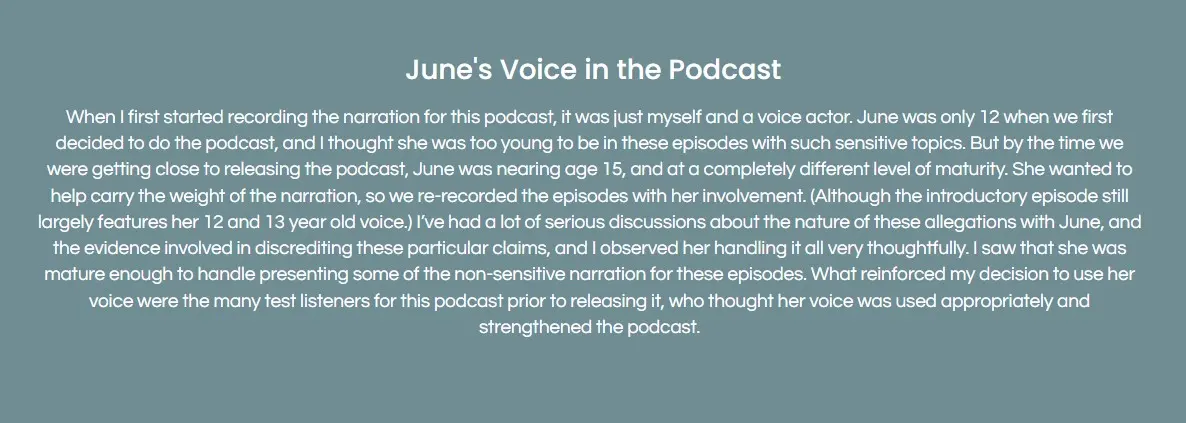The Michael Jackson Case For Robotics

Dec 13, 2022
Remember Ben from Cornwall—the psychosexual therapist with the Irish accent who initially believed Michael Jackson was a predatory child molester, until he did his own research? Yeah, I know—he wasn’t very convincing.
Recently, I came across a relatively new podcast advocating for Michael Jackson's innocence, called The Michael Jackson Case for Innocence, supposedly led by a mother-and-daughter team. The teenage daughter, June, became a fan of Michael Jackson at the age of ten after exploring 80s music. Her mother, Sheryl, initially had no interest in Jackson’s music or the allegations against him.
However, following the release of Leaving Neverland, their household was deeply affected. Sheryl felt uncomfortable about the fact that her daughter’s idol had been accused of committing heinous crimes against children, and even encouraged her to take the allegations very seriously.
But Sheryl's moral compass wouldn’t allow her to take Leaving Neverland at face value. So, just like any responsible middle-aged adult, Sheryl—supported by her husband—embarked on a lengthy and time-consuming fact-finding crusade. Strangely, this didn’t seem to involve much exploration into the behavioural patterns of child molesters (aside from very selective parts), or how victims are groomed, seduced, and abused. Instead, she buried herself in a collection of Michael Jackson glorification websites and fan-made “documentaries” like Square One—all of which are listed as “factual” resources on her website.
To date, Sheryl has published 11 podcast episodes, including a trailer. These begin with the Chandler allegations, with the latest focusing on the Arvizos. All are available on her website and her Twitter account: @Case4Innocence.
The website itself doesn’t exactly scream impartiality. It features images of Sheryl and her daughter—often dressed in MJ-themed clothing—alongside carefully curated Jackson artwork and, of course, their remarkable story, which they felt compelled to share with the world.
Even if Sheryl is trying to portray herself as someone who was initially neutral regarding the allegations, one can’t help but question why a middle-aged parent is now publicly using her daughter to glorify a man in whom she supposedly had no prior interest—until experiencing one of those conveniently timed road-to-Damascus moments.
It all sounds rather contrived and insincere: the idea that a young girl was so distraught by the release of Leaving Neverland that it launched her mother into months of “intensive fact-checking”, which just so happened to end in the full exoneration of Michael Jackson.
Some fan sites and Twitter users are thrilled that these relative newcomers to the Jackson fandom have produced a podcast asserting his complete “innocence”. Vindicate MJ, one of their prominently cited sources, even dedicated an entire blog post to describing Sheryl as an:
Exemplary mother who didn’t want to leave her daughter alone to deal with the Leaving Neverland mess and its aftermath, and who undertook a thorough investigation of the allegations against Michael Jackson to see whether they are true or not.
Twitter user Jenny Winings (@JennyW526) appears to be thoroughly convinced by the perceived factual accuracy of the podcasts, to the point that she posted an extremely inflammatory comment directed at Martin Bashir.
Listening to @Case4Innocence newest episode makes me LOOOOOOATHE Martin Bashir even more. What a piece of shit he is. He can rot in hell please.
Additionally, The MJCast (@TheMJCast)—which regularly features the so-called “award-winning investigative journalist” Charles Thomson—has retweeted episodes of the podcast.
Okay, What’s the Big Deal, I Hear You Ask?
This certainly appears to be yet another instance of a poorly disguised Michael Jackson stan, who believes it’s a good idea to involve her teenage daughter in an effort to drum up more followers for the fan base.
However, I have serious doubts about the authenticity of the mother-daughter team as presented on their website and podcast.
First and foremost, I have little doubt that Sheryl is being disingenuous. She claims to have reviewed thousands of documents related to Michael Jackson—including those detailing his troubling interactions with young boys—yet insists they prove his complete innocence. Notably, she alleges that Tom Sneddon falsely attested to the accuracy of Jordan Chandler’s description of discolouration, keeping the evidence under lock and key, away from other law enforcement officers who simply took his word for it. She also endorses Mary Fisher’s GQ article, the film Square One, and the absurd Sodium Amytal story.
What struck me most, however, were the podcasts themselves. Natural podcasts typically include background noise, coughing, laughter, and overlapping speech—but there’s something off about Sheryl, the mother. Her delivery sounds oddly robotic: flat in tone, oddly pronounced in places, and almost entirely devoid of emotion. What’s more, she never seems to pause for breath, even during extended passages.
Listen to the first podcast trailer below.
Undoubtedly, every podcast episode features two female voices, alongside so-called “voice actors” who contribute to the conversation. However, one might reasonably question whether these are real individuals, or if the entire dialogue is generated by an artificial intelligence text-to-speech programme.
For those unfamiliar, text-to-speech is essentially the reverse of speech-to-text—a feature commonly found on Android or Apple devices. Instead of speaking and watching the words appear on-screen, text-to-speech involves using an online service that produces a natural-sounding voice reading out a 10,000+ word article. This process doesn’t require a human to painstakingly record or narrate the transcript; rather, it uses artificial intelligence to emulate the cadence and tone of a voice actor.
During my exploration of text-to-speech, I was astonished by how convincing it can sound. Numerous websites offer this service—some free but limited in quality, others paid with remarkably lifelike results. Users can choose from hundreds of voices, often customisable, with some platforms even enabling the cloning of one’s own voice. These services integrate recordings seamlessly with sound effects and music, eliminating the need for additional video or audio software to publish polished content.
Below is a sample taken from the first paragraph of this website using murf.ai.
Why Do I Think the Podcast Is Made using AI?
As mentioned earlier, even the most professionally produced podcasts exhibit the occasional imperfection. Real individuals convey emotion through their voices—particularly when addressing sensitive subjects. In conversations involving two or more people, one typically expects brief instances of laughter, overlapping speech, the odd cough, deep breath, or minor correction. Yet none of these natural markers are present across the 11 full-length episodes of The Michael Jackson Case for Innocence podcast. Instead, the delivery is a continuous stream of evenly toned preaching.
Each episode, for instance, opens with the identical phrase: “Welcome to The Michael Jackson Case for Innocence podcast,” followed by the speaker’s name and, in some episodes, an introduction to her daughter. This same phrasing appears in every single episode. While it’s possible the five-second introduction was pre-recorded and edited into each episode, it seems unlikely—there would be little logic in repeatedly reusing such a short clip. More tellingly, the speaker transitions straight into the main topic without a pause or tonal shift, as though reading a single, unbroken sentence.
While advanced, these artificial text-to-speech programmes aren’t flawless. They may pronounce many words clearly and naturally, but their limitations become evident in their robotic consistency: identical sentence timing and the uniform pronunciation of every word—something no real speaker replicates.
June, the daughter’s voice, sounds considerably more convincing. She could well be a real person—perhaps the creator of the podcast herself—or a paid “voice actor”. Yet, like Sheryl, her delivery remains emotionally flat. She never laughs, interjects, or talks over her mother, which feels oddly scripted.
The website states that Sheryl, the mother, tackles the more serious, mature topics, while June discusses the more mundane. Still, if these are indeed two real individuals, it seems highly improbable that they would not record together—even for the lighter material.
Strange Tweets
On 4 October 2022, the @Case4Innocence Twitter account posted a rather peculiar tweet, claiming they had been grappling with “long-standing vocal cord issues” and had inadvertently released recordings that were never intended for public release.
As the primary narrator for the series, I want to note that I have longstanding vocal cord issues, requiring multiple recordings. Earlier today a few rough draft recordings were mistakenly released as our first episode--apologies if you downloaded these before they were deleted!
To my knowledge, individuals with vocal cord issues typically exhibit frequent coughing and throat clearing, rather than speaking in a consistently robotic manner.
The idea that Sheryl managed to record at least 11 full-length podcast episodes with such an unnaturally even tone, despite allegedly suffering from a vocal cord condition, seems highly implausible.
Perhaps they were still experimenting with text-to-speech AI software and inadvertently published material that was never intended for release. Alternatively, it might have been Sheryl’s real voice early on—before switching to AI-generated narration.
One Twitter user, @CdnCapedCrusadr, who expressed admiration for the podcast, commented:
This is a fascinating podcast concept. If you are at all interested in #Michael Jackson, as a fan or detractor, or interested in true crime podcasts give this one a subscribe and listen. Accessible, objective & informed from the most unique genesis. (listens smooth at 1.25x speed).
That’s certainly unusual. I’ve never come across a podcast featuring real people where adjusting the playback speed was necessary just to make the voices sound natural.
Maybe They Just Used Voice Actors and AI, but Haven’t Disclosed
Admittedly, one could argue that using voice actors and AI-generated narration still constitutes a podcast. However, according to information provided on the website—and reinforced by the tweet referencing vocal issues—both the mother and daughter are said to have recorded their own voices. It even states that June was not involved in the initial episodes, but as she matured, earlier instalments were re-recorded to feature her voice.

I sent a fabricated email to The Michael Jackson Case for Innocence, commending them for their work.
It read as follows:
Dear Sheryl and June,
I just want to say that I recently discovered your podcast through Twitter.
Just like you, I was one of those individuals who believed Michael Jackson was guilty until I did my own research.
The way you and your teenage daughter present the facts are impeccable. Both of you speak in a way that is clear, easy to understand and highly professional, just like a newsreader who has decades of experience.
I hope both you and your daughter continue to record your voices for more podcasts in the future.
Many thanks.
I got the following reply:
Hi David,
Thanks for taking the time to write to us. We appreciate your thoughtful and positive comments, so glad you find the presentation clear and professional. Hope you continue to enjoy the podcast! We are especially excited about Season 2.
Best,
Sheryl & June
I made a deliberate effort to praise the quality of their voices and expressed my hope that they would continue producing new episodes. Interestingly, the individual behind the podcast did not dispute that the voices belonged to them or their daughter.
The Voice “Actors”
The website is transparent about its use of voice “actors” for certain segments of the podcast. However, it gives the impression that these individuals are not merely cooperative contributors, but also possess a deep understanding of the subject matter—rather than being paid performers reading from a script.
For example, voice actor Paul Stefano (@paulstefano) has publicly acknowledged his involvement in the podcast:
Are You a Michael Jackson Fan? Critic? Listen to the podcast I'm a part of for a fascinating look into the trial and allegations against the King of Pop. #vo #voiceover #podcast #podcasting #michaeljackson
I sent the following email to Paul Stefano:
Hello,
I recently discovered your work, or I should say your voice on a podcast called The Michael Jackson Case for Innocence.
I am also interested in making a similar podcast, and would like to use your voice for my project. However, I'm not entirely sure how it works.
I presume you don't come round to my house, but instead I send you a transcript which you then record.
Also, I did watch a YouTube video about how you say you have licensed your voice, but again, I'm not entirely sure what this means. I get the impression that I may be able to use a website service where I can literally just type words into a box, and within a matter of seconds hear your voice read those words.
Is this correct?
Many thanks for your time.
I got the following reply:
Hi,
Thanks for thinking of me. For a podcast no licensing is necessary. It's just a one time fee based on the amount of words in each episode. Do you have scripts ready yet? Do you know how many words you would need me to voice?
Paul
I sent one more email:
Hello,
No, no script is ready at the moment. But just to make things clear, if or when my script does become ready, I just send it to you via email, and then you send a recording back to me, and so on.
Sorry for the stupid questions, but I'm in the process of learning.
Many thanks.
Last reply:
Yes, so I would record the script. You could offer any suggestions on things to adjust or change, then I would send you a new recording.
See email screenshots here.
So yes, he is simply a paid voice actor, with no particular knowledge of or interest in the material he narrates. He works from a provided script and is happy to make alterations upon request.
For example, in The Chandler Allegations Part 5: Summing Up the Evidence, Paul recites a passage from Child Molesters: A Behavioural Analysis concerning the prevalence of child pornography or child erotica among paedophiles.
Listen to the audio below.
However, Sheryl—who presents herself as a self-educated expert on the subject—appears to be unaware that Michael Jackson was found to be in possession of child erotica, not only in the form of books authored by known paedophiles, but also a fully nude photograph of a boy believed to be Jonathan Spence.

Conclusion
Undoubtedly, someone has invested considerable effort in producing this podcast. Whether it is AI-generated or genuine remains uncertain, but I am over 90 per cent convinced that the voice is not authentic. Even if it were, there is no denying that Sheryl—or whoever they may be—is a complete charlatan. They have not objectively assessed all the evidence or reviewed the full body of documentation before concluding that Michael Jackson was entirely innocent. This appears to be yet another thinly veiled Michael Jackson stan project, wrapped in a preachy and indoctrinating format.
Another puzzling element is their refusal to disclose their surname for privacy reasons. It seems contradictory to post photographs of themselves and their daughter, yet claim reluctance to share a surname in the name of privacy. This inconsistency suggests that the individual behind the podcast anticipates scepticism and scrutiny, prompting pre-emptive justifications.
As ever, I cannot conclude this blog post without drawing attention to the irony. We are led to believe that Sheryl is a responsible and concerned mother who initially felt uneasy about her daughter idolising Michael Jackson and listening to his music, given the strong likelihood that he was a child molester. Yet, after researching supposedly “exonerating” evidence—which must have included Jackson’s documented desire to be alone with unrelated young boys in the privacy of his room and bed—she opts not to educate her daughter about the dangers posed by such behaviour. Instead, she chooses to produce a podcast, launch a website, and run social media accounts that glorify it.
Update:
It appears that @Case4Innocence has been made aware of criticisms regarding the artificial nature of the podcast. On 27 December 2022, a so-called “bloopers” audio clip was released in an apparent attempt to convince her more credulous followers that she is indeed using her own voice.
Listen to the audio below.
The short three-minute and 43-second audio contains few genuine bloopers. In fact, it seems more focused on praising supporters and Twitter users who help disseminate the “truth” about Michael Jackson.
Sheryl, the seemingly impassive mother, had initially planned to release an unscripted conversation between herself and her daughter but ultimately decided against it.
The reason? Neither Sheryl nor June excels at producing spontaneous, unscripted content unless following a detailed script. That in itself is a curious claim—after all, casual off-the-cuff dialogue ought to be second nature.
In response to my blog post, it appears that the daughter, June, is capable of laughter—which isn’t entirely surprising, given my suspicion that her voice is likely authentic (though, as I’ll explain later, some caution remains warranted). Sheryl, on the other hand, does not appear to laugh—at least not in the robotic tone that permeates every podcast episode.
While June’s voice is relatively clear, Sheryl’s is muffled and difficult to discern, requiring audio enhancement software to make out. On repeated plays, the differences become increasingly evident. First, ambient background noise is present. Second, she appears to converse naturally with her “daughter”. Most notably, the robotic, emotionless tone—devoid of breaths or inflection—is absent, as are any signs of the chronic “vocal cord issues” she previously claimed to suffer from.
Listen to the enhanced example below.
However, I can’t deny that there is a similarity between the two voices. That said, I believe I can explain what this individual has likely done. As outlined earlier in this article, many text-to-speech services not only allow users to select a voice actor’s tone, but also offer the option to clone their own voice.
For instance, one such service, Resemble.ai, states the following:
Upload your own voice data without worrying about formatting and cleaning. We handle all of that for you. As long as you have an audio file, our engine can take it from there.
Resemble AI can clone a voice with as little as 3 minutes of data. Try recording and cloning your voice for free with just 25 sentences online.
A recent segment on BBC’s Morning Live highlighted a growing trend in which scammers use AI to clone individuals’ voices from their social media profiles. The fraudsters then attempt to extort money from the targeted person’s family by falsely claiming that their loved one is in serious trouble.
Watch the Morning Live clip here.
Once again, I remain convinced that the individual behind this—whoever they may be—is not using their genuine voice, but is instead scraping content and using AI technology to transcribe and assemble it. The polished mix of sound effects and background music, despite Sheryl’s claim to be a novice producing her first podcast series, strongly suggests the use of a professional service.
Of course, a straightforward way to prove me—or anyone else—wrong would be for Sheryl to upload a video of herself and her daughter seated around a table, having a natural conversation. No tricks, no illusions: let’s see and hear for ourselves whether Sheryl’s voice genuinely matches that of the podcast. Let’s determine once and for all whether she truly suffers from “long-standing vocal cord issues” and struggles to complete a sentence without frequently clearing her throat. If the photos on the website and Twitter account do indeed depict them accurately, there should be no grounds for refusing such a demonstration on the basis of privacy.





